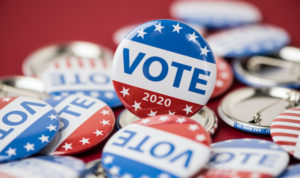
Vice President Biden wins the presidential election, President Trump fires Defense Secretary Esper, and more…
IN THE NEWS
- Major media outlets declared former Vice President Joe Biden the winner of the 2020 presidential election, beating incumbent President Donald J. Trump after winning 290 electoral college votes. U.S. Senator Kamala Harris (D-Calif.) will become the first Black, Asian, and woman Vice President of the United States because of the historic win. President Trump, however, has refused to concede victory to President-elect Biden. Although President Trump’s campaign filed a series of lawsuits challenging the results of the election, many of these suits have been dismissed because the campaign failed to provide credible evidence of fraudulent results. December 8 is the deadline to resolve election disputes, and the Electoral College will cast their votes to confirm former Vice President Joe Biden as the President-elect on December 14.
- President Trump fired U.S. Department of Defense Secretary Mark Esper, replacing him with Acting Defense Secretary Christopher Miller. President Trump reportedly fired Esper because Esper publicly announced his opposition to President Trump’s threats to use active-duty troops to quell racial justice protests. Congressional Democrats warned that the decision could threaten national security during a presidential transition of power. In a letter to the President, Esper wrote that he accepts President Trump’s decision to replace him because he serves the country “in deference to the Constitution,” and that he has “never been prouder” to serve the United States.
- The U.S. Food and Drug Administration (FDA) authorized the use of bamlanivimab, a COVID-19 antibody treatment developed by pharmaceutical company Eli Lilly. The emergency authorization will permit use of the drug on patients who are newly infected with mild to moderate COVID-19 and at high risk of progressing to severe disease or hospitalization. FDA noted that the treatment will not benefit patients who are already hospitalized due to severe infection. Rather, the antibody may worsen the condition of hospitalized patients who require high flow oxygen or mechanical ventilation. Eli Lilly expects to make up to one million doses of the treatment by the end of the year.
- The U.S. Federal Trade Commission (FTC) approved a settlement with Zoom Video Communications, Inc. over allegations that the video conferencing platform misrepresented the level of call privacy that users could expect on the platform. As part of the settlement, Zoom will be required to implement a data security program that better protects sensitive user information such as health and financial data. In his dissenting statement, FTC Commissioner Rohit Chopra criticized the settlement, writing that it “includes no help for affected parties, no money, and no other meaningful accountability.”
- Georgia Secretary of State Brad Raffensperger announced that his office will begin a hand-counted audit of the state’s presidential election results. President-elect Joe Biden currently leads President Trump by over 14,000 votes, but the Trump campaign and the Georgia Republican Party requested a recount. Senators Kelly Loeffler (R-Ga.) and David Perdue (R-Ga.) called for Raffensperger’s resignation, citing unspecified election “mismanagement and lack of transparency.” Raffensperger set a November 20 deadline to complete the recount. Poll workers from each county will count the ballots with observers from both campaigns present. Raffensberger said the audit was because of the “national significance” of the election and the “closeness of the race,” and was not motivated by President Trump’s demands for a recount.
- The European Union (EU) announced plans to impose a tariff on $45 billion worth of goods imported from the United States. Earlier this month, the World Trade Organization (WTO) issued a decision, holding that the United States violated international rules in providing subsidies to Boeing and permitting the EU to levy a tariff on Boeing model imports. The EU’s new tariff comes after the United States imposed a $7.5 billion tariff on some imported European products last year. EU Commissioner Valdis Dombrovskis reportedly said that “as soon as the United States is willing to drop their tariffs, we are willing to drop our tariff.”
- The United Kingdom’s Department for Transport issued a ban on travelers from Denmark after the discovery of a new mutation of the coronavirus in Denmark’s farmed mink population. Secretary of State for Transport Grant Shapps tweeted that all British citizens returning from Denmark would be required to self-isolate for two weeks without exception. Three days before the British agency issued the travel ban, government officials in Denmark announced that it would order the culling of the country’s entire mink population, totaling over 15 million minks, to contain the outbreak of the mutated virus. The mutated coronavirus has infected 214 people in Denmark as of November 5.
- The National People’s Congress of the People’s Republic of China issued a directive that disqualifies any individual, who officials deem to be disloyal to Beijing, from holding office in Hong Kong’s Legislative Council. Shortly after the announcement, officials in Beijing ousted four pro-democracy legislators from Hong Kong’s government, prompting the remainder of the opposition party to resign. Wu Chi-wai, one of the lawmakers who vowed to step down in protest, remained hopeful that the city would regain its autonomy, reportedly saying that “under authoritarianism, the road to democracy will be extremely long and arduous, but we will absolutely not be defeated by its pressures.” In a statement, U.K. Foreign Secretary Dominic Raab announced that China’s directive was in breach of the Sino-British Joint Declaration, a treaty between the two countries designed to protect Hong Kong’s political autonomy, opening the door to possible sanctions.
- The Centers for Disease Control and Prevention (CDC) issued guidance on how to engage safely in Thanksgiving activities during the coronavirus pandemic. The CDC emphasized that the guidance is intended to supplement, not replace, local regulations. The CDC recommended limiting travel and large family gatherings as much as possible. If people must gather, however, the CDC advised people to limit the length of the gathering, allow ample air flow, ensure everyone wears masks, and encourage guests to regularly sanitize their hands.
WHAT WE’RE READING THIS WEEK
- In a white paper for the Brookings Institution, Peter Conti-Brown and Brian Feinstein, professors at the Wharton School, explored how the Board of Governors of the Federal Reserve System uses Twitter to communicate policies and respond to criticisms by others, especially President Trump. Conti-Brown and Feinstein discovered that discussions about the Federal Reserve on Twitter trend toward criticism, perhaps harming the Federal Reserve’s objectives. Conti-Brown and Feinstein concluded that the Federal Reserve can use these results to inform how it communicates key policies to the public.
- The U.S. Government Accountability Office (GAO) released a report evaluating the U.S. Department of Defense’s efforts to reform its business operations, which, according to GAO, is at high risk of waste, fraud, and abuse. GAO found that the agency’s efforts have been largely successful, resulting in savings of $37 billion from fiscal years 2017 through 2021. GAO recommended that the agency keep better documentation of cost savings to reduce possible areas for waste in the long term.
- In a report for the Center for American Progress, Simon Clark, Karuna Nandkumar, and James Lamond present four short-term legislative efforts that the U.S. Congress should adopt to address the threat of violent white supremacists. Clark and his coauthors recommended that Congress increase criminal penalties for lynching through an anti-lynching bill, strengthen the U.S. Department of State’s mechanisms to counter violent white supremacy abroad, identify and remove violent white supremacists in the military and law enforcement, and improve data collection and analysis of domestic terror threats.
FLASHBACK FRIDAY
- In an essay in The Regulatory Review, Richard J. Pierce, Jr., professor at the George Washington University Law School, emphasized that the U.S. Congress must figure out how to govern in an increasingly polarized electorate. First, Pierce argued that to promote governance in a divided society, primary elections should be eliminated and party leaders should select who best represents their party in an election. Second, Pierce proposed eliminating congressional caucus rules that give the majority party the power to select agenda items. Pierce concluded that these reforms would help the U.S. Congress “learn to work—and compromise—again.”



